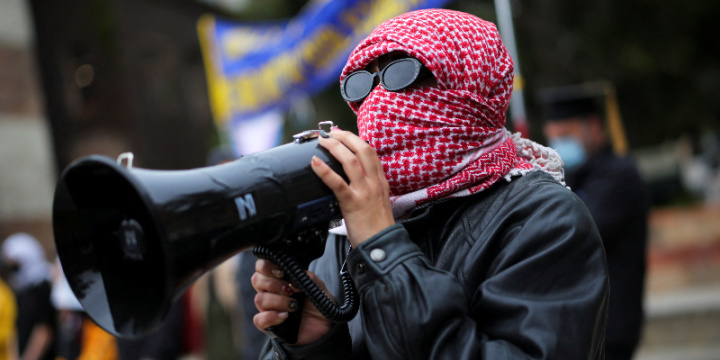A pro-Hamas demonstrator uses a bullhorn during a protest at the University of California Los Angeles (UCLA) on March 11, 2025. Photo: Daniel Cole via Reuters Connect.
From Upper Manhattan to Antwerp, the world is watching what happens at Columbia University. The lesson will be simple: when Jews are targeted, do elite universities face real consequences — or just wait out the headlines and move on?
That’s why the Trump administration’s decision to freeze Columbia’s Federal funding was so significant. It wasn’t just bold — it was a necessary declaration that the civil rights of Jewish students matter. But with a deal now in place, the real test is whether that moment of strength leads to meaningful reform — or something far more forgettable.
New reporting now shows that Columbia has issued sweeping disciplinary measures for the Butler Library takeover and earlier protests. Students have reportedly been suspended for multiple years, expelled, and in some cases even had their degrees revoked. That is real, and welcome — and it speaks to what pressure can achieve when applied seriously.
But even this action underscores the broader point: Columbia’s most serious reforms have come not from internal will, but external scrutiny. These punishments address incidents — not institutions. They correct specific moments of lawlessness, but do not transform the disciplinary and governance systems that failed in the first place.
Columbia’s recent public statements have emphasized symbolic steps — “incorporating” the IHRA working definition of antisemitism, launching antisemitism training, and reporting on Title VI complaints. These are fine, but without structural changes behind them, they amount to little more than window dressing.
The most important step so far — removing disciplinary oversight from the University Senate — came only after sustained pressure, and still leaves unanswered questions about implementation, consistency, and faculty involvement. The US Department of Justice’s monitoring role, as described in press reports, may amount to little more than checking boxes — calling balls and strikes on future incidents rather than compelling broader accountability.
There is still no binding requirement that Columbia address faculty members who have trafficked in antisemitic rhetoric, nor a durable mechanism to prevent the re-empowerment of campus factions that turned a blind eye to intimidation and disruption. The recent punishments show that enforcement is possible. But that makes the absence of structural guarantees all the more conspicuous — and risky.
This matters far beyond New York. Universities in Europe and beyond — many of which face even greater risks of political violence — are watching. They are watching not only to see if Columbia’s leadership will hold, but whether the United States government is willing to insist on something more than temporary optics.
A weak deal that doesn’t last at Columbia will be read globally as a signal that American scrutiny is loud but fleeting — and that institutions that tolerate antisemitic intimidation can outlast their critics. A strong deal that holds, by contrast, would establish a precedent for real accountability: one that affirms that the civil rights of Jewish students are non-negotiable and that Title VI enforcement has lasting teeth.
The administration has already proven it is willing to act. The funding freeze was a game-changer. The next step is ensuring that this power — and this precedent — aren’t traded away for incrementalism dressed up as progress. Justice cannot hinge on whether the news cycle is still paying attention.
The students who stormed Butler Library will face consequences. That’s a start. But the question is whether future students — at Columbia or anywhere else — will be deterred by a clear system of rules, or emboldened by the knowledge that institutional memory fades fast.
That’s why the deal matters. Not because of the money, but because of what it says about what the government expects — and what universities can get away with. This administration took the right step. Now it must follow through. What happens next at Columbia still matters.
J. Philip Rosen is chairman of the World Jewish Congress, American section. He has been a Jewish activist for most of his life and is currently a Board member of Yeshiva University and JINSA, and is Vice-Chairman of the Republican Jewish Coalition.
The post What Happens Next at Columbia Matters Everywhere first appeared on Algemeiner.com.
Click this link for the original source of this article.
Author: J. Philip Rosen
This content is courtesy of, and owned and copyrighted by, https://www.algemeiner.com and its author. This content is made available by use of the public RSS feed offered by the host site and is used for educational purposes only. If you are the author or represent the host site and would like this content removed now and in the future, please contact USSANews.com using the email address in the Contact page found in the website menu.








